英语人教版八年级下册unit 3 阅读课
- 格式:docx
- 大小:17.99 KB
- 文档页数:7

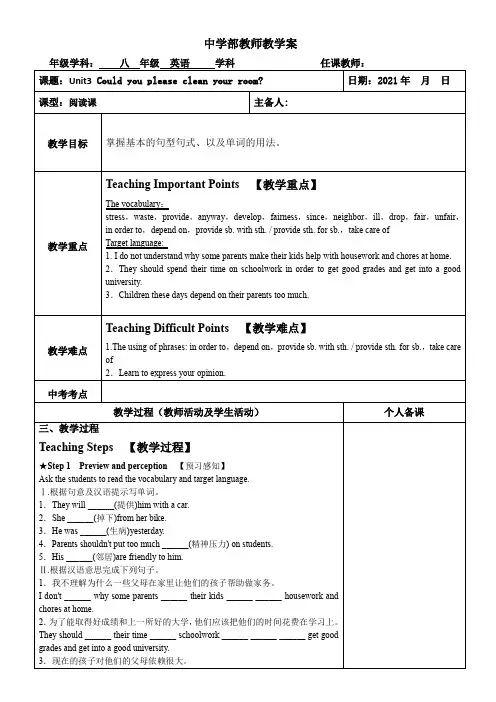
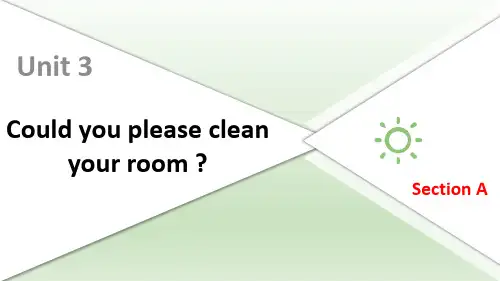
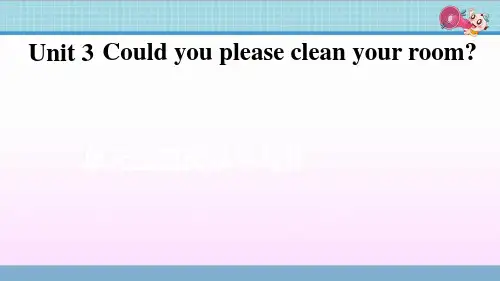
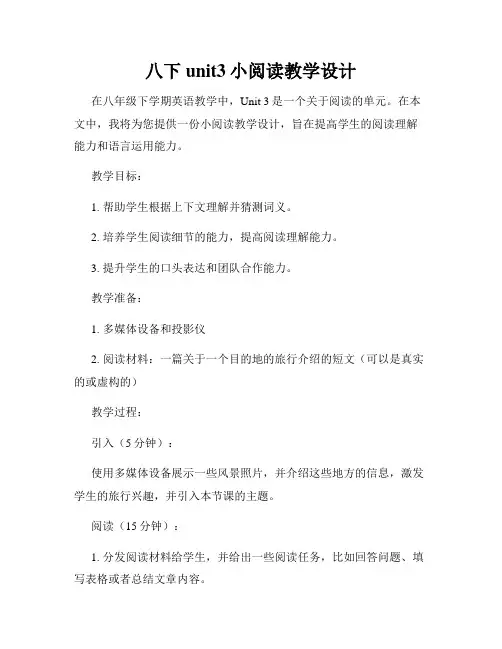
八下unit3小阅读教学设计在八年级下学期英语教学中,Unit 3是一个关于阅读的单元。
在本文中,我将为您提供一份小阅读教学设计,旨在提高学生的阅读理解能力和语言运用能力。
教学目标:1. 帮助学生根据上下文理解并猜测词义。
2. 培养学生阅读细节的能力,提高阅读理解能力。
3. 提升学生的口头表达和团队合作能力。
教学准备:1. 多媒体设备和投影仪2. 阅读材料:一篇关于一个目的地的旅行介绍的短文(可以是真实的或虚构的)教学过程:引入(5分钟):使用多媒体设备展示一些风景照片,并介绍这些地方的信息,激发学生的旅行兴趣,并引入本节课的主题。
阅读(15分钟):1. 分发阅读材料给学生,并给出一些阅读任务,比如回答问题、填写表格或者总结文章内容。
2. 学生独立阅读短文,并尝试完成阅读任务。
解答问题(10分钟):收集学生的答案,并展示于投影仪上。
鼓励学生彼此讨论并解释答案的依据。
教师在此过程中进行必要的纠正和辅导。
词义猜测(15分钟):选取短文中的几个生词或者词组,让学生根据上下文和自己的常识猜测词义。
鼓励学生互相提供帮助,并将猜测的答案写在黑板上进行讨论。
细节理解(15分钟):教师提出一些针对文章细节的问题,鼓励学生在答案中引用文章中的具体信息。
学生可以在小组内进行思考和讨论,然后向全班汇报。
口头表达(15分钟):为了锻炼学生的口头表达能力,教师可以组织学生进行小组讨论,讨论他们最喜欢的旅行地点,并解释原因。
每个小组选择一位代表来陈述他们的观点。
拓展(10分钟):根据学生展示的内容,教师可以分享一些关于旅行目的地的有趣知识或故事,并鼓励学生提问和分享自己的旅行经历。
结束(5分钟):总结本节课的重点和学到的知识,鼓励学生为下一节课预习相关内容,并提出问题或意见。
这是一份简单的八年级下学期英语Unit 3小阅读教学设计。
根据实际情况,您可以根据学生的水平和教学时间进行适当调整。
通过这样的教学设计,学生将能够提高阅读理解能力、语言运用能力以及口头表达和团队合作能力。
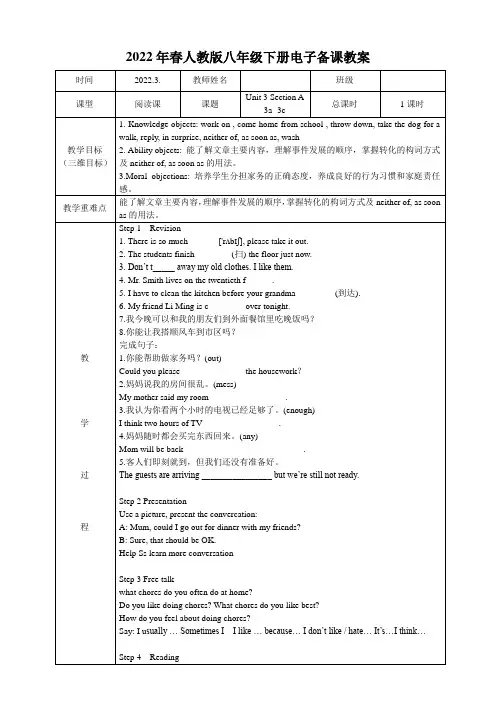
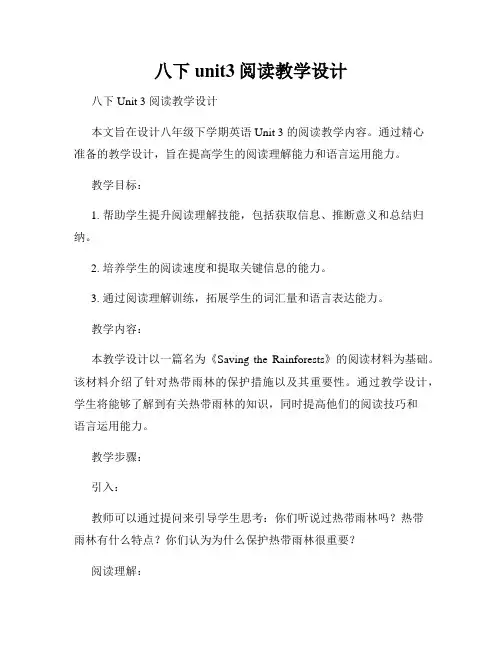
八下unit3阅读教学设计八下 Unit 3 阅读教学设计本文旨在设计八年级下学期英语 Unit 3 的阅读教学内容。
通过精心准备的教学设计,旨在提高学生的阅读理解能力和语言运用能力。
教学目标:1. 帮助学生提升阅读理解技能,包括获取信息、推断意义和总结归纳。
2. 培养学生的阅读速度和提取关键信息的能力。
3. 通过阅读理解训练,拓展学生的词汇量和语言表达能力。
教学内容:本教学设计以一篇名为《Saving the Rainforests》的阅读材料为基础。
该材料介绍了针对热带雨林的保护措施以及其重要性。
通过教学设计,学生将能够了解到有关热带雨林的知识,同时提高他们的阅读技巧和语言运用能力。
教学步骤:引入:教师可以通过提问来引导学生思考:你们听说过热带雨林吗?热带雨林有什么特点?你们认为为什么保护热带雨林很重要?阅读理解:步骤1:教师给学生分发阅读材料《Saving the Rainforests》。
步骤2:学生自主阅读材料,并在心中标记关键信息。
步骤3:学生互相讨论他们所阅读的内容,并一起解答问题。
步骤4:教师带领学生一起解析材料中的生词和短语,并让学生进行拓展学习。
步骤5:教师给学生分发有关阅读材料的练习题,指导学生独立完成。
拓展活动:步骤1:教师组织学生进行小组讨论,让他们分享在阅读中学到的新知识,以及自己对热带雨林保护的看法。
步骤2:学生展示他们在小组讨论中得出的结论,并与全班分享。
步骤3:教师组织学生进行相关主题的写作活动,比如写一篇关于热带雨林保护的短文。
教学评估:教师可以通过以下方式对学生的学习成果进行评估:1. 教师观察学生在课堂讨论和小组活动中的表现。
2. 对学生完成的练习题进行批改和评分。
3. 对学生的写作作品进行评估,包括语言表达的准确性和逻辑性等方面。
教学延伸:为了进一步提升学生的阅读理解能力,教师可以引导学生阅读更多关于热带雨林保护的文章,并进行相关的讨论和写作活动。
同时,教师还可以将阅读与听力、口语和写作等技能相结合,帮助学生全面提升英语综合运用能力。
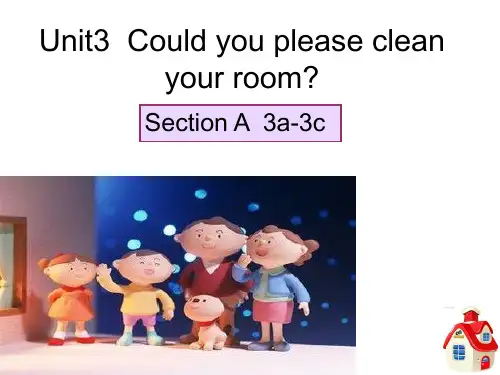

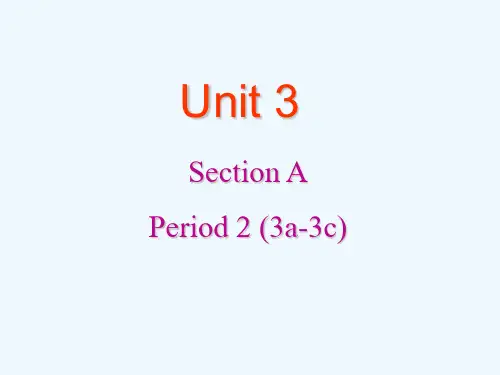
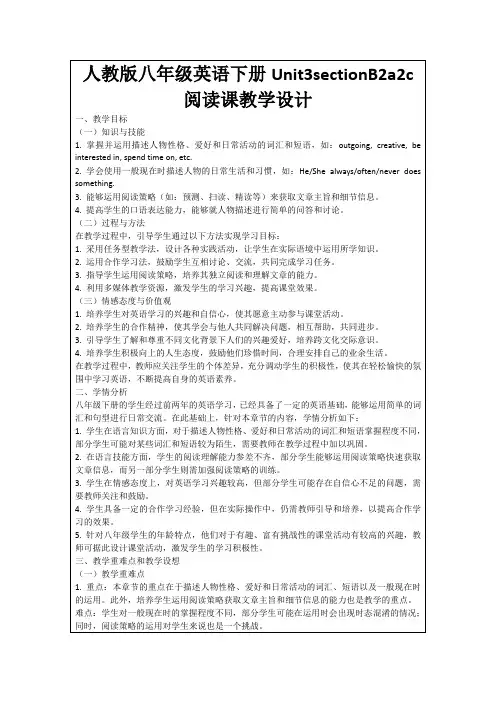
Unit 3 Could you please clean your room?Section A 3a—3c 读写课教学设计一、教材分析本课是新目标八年级下册第三单元Section A 的阅读部分,它的任务不仅仅是训练和提高阅读技能,也涵盖了实际交际、词汇和知识点等内容,同时它还承载着培养正确的情感态度、价值观等深层意义,培养学生分担家务的责任感。
教学内容贴近学生生活,学生有一定的学习兴趣。
二、学情分析本节课的授课对象为八年级的37名学生,大部分学生平时接触英语阅读材料的机会较少,学生通常是为了做题而阅读,所以调动学生阅读的积极性,使其在阅读过程中主动思考是本节课的重点。
本节课的话题来自学生的生活经历,学生在人教版英语七年级下册Unit 4 Don’t eat in class. Section B 中已经学习了许多表示家务劳动的动词短语:do the dishes, help his mom make breakfast, clean his room等,为学生们的口语表达和书面表达提供了语言基础。
三、教学目标1. 知识与技能:细读文章,学习相关的短语及表达,理解文章的含义,能复述课文内容。
(1) 短语:throw down, the minute / as soon as, come over, all the time, in surprise等。
(2) 句子:a. The minute I sat down in front of the TV, my mom came over.b. I’m just as tired as you are!c. For one week, she did not do any housework and neither did I.2. 过程与方法:熟练运用各种阅读技巧,如:推测、略读、寻读、细读、思维导图等方法,掌握全文内容。
3. 情感态度及价值观:要爱自己的父母,学会分担家务。
人教版初中英语八下unit3阅读课教案教案标题:人教版初中英语八下Unit 3 阅读课教案教案目标:1. 通过本课的阅读活动,学生能够理解并掌握有关旅行经历的词汇和表达方式。
2. 培养学生的阅读理解能力,能够根据文章内容回答问题。
3. 提高学生的语言运用能力,能够运用所学知识进行口头表达和书面表达。
教学重点:1. 学习并掌握与旅行经历相关的词汇和表达方式。
2. 培养学生的阅读理解能力,能够通过阅读文章回答问题。
教学难点:1. 学生对于文章中的生词和长句的理解与掌握。
2. 培养学生的阅读理解能力,能够根据文章内容回答问题。
教学准备:1. 多媒体设备2. 学生课本和练习册教学过程:Step 1:导入(5分钟)通过图片或问题导入课题,引起学生的兴趣,激发学生对旅行的思考和讨论。
Step 2:阅读活动(20分钟)1. 教师出示课文,让学生自主阅读,了解文章大意。
2. 学生分组讨论并回答以下问题:- What did the writer do last summer?- How did the writer feel about the trip?- What did the writer see and do during the trip?3. 教师引导学生根据文章内容回答问题,并纠正学生的错误答案。
Step 3:词汇和表达方式学习(15分钟)1. 教师出示课文中的生词和短语,帮助学生理解并掌握词汇。
2. 学生进行词汇拓展活动,使用所学词汇造句并展示给全班。
3. 教师引导学生学习文章中的表达方式,如描述过去的经历、感受和建议等。
Step 4:阅读理解练习(15分钟)1. 学生个人或小组完成练习册中的相关阅读理解练习。
2. 教师逐一检查学生的答案,解释并讲解正确答案。
Step 5:语言运用(10分钟)1. 学生进行口头表达练习,模拟自己的旅行经历,并用所学表达方式进行描述。
2. 学生完成书面表达练习,写一篇关于自己旅行经历的短文。
初中英语阅读课教学设计培养提取信息能力提高阅读解题效率张琴Ⅰ教材分析本篇文章以马丁路德金逝世的日子为主线,运用过去进行时讲述了人们能记得自己在某个重要的日子或重要的时刻正在做的事情。
通过文章,学生了解一些具有重大意义的事件,并且从中体会过去进行时在阅读语篇中的应用。
ⅡTeaching Content: Do you remember what you were doing?ⅢTeaching Targets:1.to know the dates of some events and their background;2.to master a reading skill---find out relative information.ⅣTeaching Points:1. help students read in three steps;2. find out key words which connect questions to the text.ⅤTeaching aids:multi-media, English book in Grade8, relative papersⅥTeaching Procedures:Before-reading1. Warming up (5 mins)①write some important dates for you in your daily life;②talk with your partner about the important dates for Chinese.(设计意图:通过课前小讨论,让学生对即将要阅读的内容进行初步判断和揣测,由考虑个人重要日子转为国人的重要日子,使学生情感得以提升。
)2. Presentation (5 mins)①play a short film about Martin Luther King’s speech;②give a brief introduction about martin.(设计意图:通过短片及简要的人物介绍,学生进一步确认文章的主要人物以及背景信息,提高学生的阅读兴趣。
Section B1 (1a-2d)Step 1 RevisionYou are a tourist in a city, you want to know something about the city. Make a conversation about asking information politely.A: Could you please tell me where the nearest bank is?B: Sure, go east along this street, then you’ll see it.A: Can you tell me if there is a delicious restaurant near here?B: Sure. Walk along this street, the restaurant is on you right.A: And do you know where the biggest hospital is?B: Go down this street, turn left at the first crossing, you will see it.A: After dinner, I want to buy a pair of shoes, would you mind telling me where the nearest supermarket is?B: It’s over there, just across from you.A: Haha! I see it. Thank you very much!B: You are welcome.Step 2 Lead in1) Talk about places in your city.2) Show some pictures of places and discuss what qualities are important for eachplace.Step 3 1a & Pairwork1a What qualities are important for each place? Write the words from the box next to each place below. Write the most important words first.Pair work1b Talk about places in your city using the words in 1a. A: The Fun Arts Museum is really interesting.B: Yes, and it’s beautiful, too.A: ….Step 4 Listening (1c)1)Listen and check the sentences you hear.Conversation 1______ You can go to Green Land.Conversation 2_____ Could you tell me where the bookstore is?2)Listen to the conversations and complete the sentences.(1c)Conversation 1The boy asks about ___________, and the clerk tells him to go to Green Land.Conversation 2The girl asks about _________, and the clerk tells her to go to the corner of Market and Middle Streets.Conversation 3The mother asks about ________. The father wants to go to a ________ museum.The younger girl wants to go to a _______ museum. The boy wants to go to a __________ museum. The older girl wants to go to an ______ museum. The clerk suggests they go to the _________ museum.3)Listen again and answer the questions (1d)Conversation 1The boy asks about restaurants, the clerk suggests him go to Green Land, they have delicious salad.…Step 5 PracticeRole-play the conversations between the clerk and the tourist.A: Can you tell me where there’s good place to eat?B: Of course. What kind of food do you like?A: I’d lik e fresh vegetables.B: You can go to Green Land, they have delicious salad.A: ….Step 6 Presentation2a Where do you need to make polite requests? Think of some possible situations.Discuss them with your partner.In a foreign country.In public places like a bank, a post office, a library, a shopping mall, etc.At school.At home, especially when speaking to your elders.Zhang Ming is traveling in the USA. He wants to go to a small town but he doesn't know the way now. What should he do?Step 7 DiscussionDiscuss the language you used to make this request (要求,请求). Was it the same each time? If not, discuss why not.Step 8 Reading1) Read the article and match paragraph with its main idea.2d Read the article and underline the topic sentence for each paragraph.Paragraph 1When you visit a foreign country, it is important to know how to ask for help politely (adv. 礼貌地)….Paragraph 2Good speakers change the way they speak in different situations. …Paragraph 3Usually polite questions are longer. They inc lude expressions such as “Could youplease …?” or “May I ask …?”Paragraph 4However, it is important to learn how to use the right language in differentsituations. …2) Read the article again and answer the questions.Read paragraph 1 and answer the question.What else do we need to learn besides asking a question correctly when you ask for help?We need to learn how to be polite when we ask for help.Read paragraph 2 and answer the question.What do we need to think about when you talk to different people?We need to think about whom we speak to or how well we know them.Read paragraph 3 and answer the question.What can lead in to a request with a stranger on the street?“Excuse me, I wonder if you can help me” or “I’m sorry to trouble you, but …”before asking for help.2c Find all the direct questions and polite requests from the passage.1.2d Read the requests below. In the second column, write A if you would say it to someone you know and B if you would say it to a stranger. In the last column, write where you think these people are.Step 9 HomeworkWrite a guide to a place that you know well.。